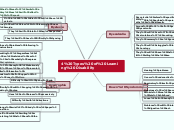4 Types of Learning Disability
Dyscalculia
Dyscalculia refers specifically to inability to perform operations in maths or arithmetic
Around 60% of Dyslexics have Dyscalculia
They will can't do well at calculations, counting.
They memory no good
They will struggles to understand chonology
They will have the difficulties with telling the time
Down Syndorome
Hearing problems.
Over-or under-active thyroid
Respiratory tract problems.
Floppiness or poor muscle tone. Muscle tone usually improves by late childhood.
Loose or bendy joints.
Problems with intestinal & digestive tract.
Dyslexia
Will affect their read, write and spell. Very less will affect their ability to speak
1 in 20 children will have Dyslexia
They will Slow in learning new words.
They will later than expected
They will have Difficulty rhyming
They will have problem following multi-step instructions
Dysdraphia
A difficulty writing, regardless of how well an individual can read, think or verbally express their thoughts/opinions.
Writes slowly & laboriously & have poor presentation.
Inconsistent letter formation - use a mixture of upper & lower case letters.
Difficulty with pencil grip
Difficulty with copying & taking notes.
Uses an eraser excessively
Difficulty with directions
Strange wrist, body or paper position.
Talking to self while writing or carefully watching the hand that is writing.
